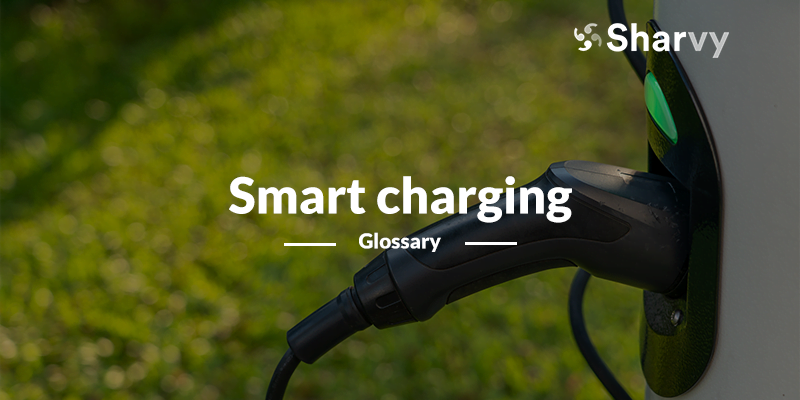What is Smart charging? – Definition
Smart Charging, also called “recharge intelligente” in French, is an advanced method of managing the charging of electric vehicles, optimizing energy use based on various parameters.
This approach involves continuous communication between the vehicle, charging points, and charging operators via secure data connections. This allows for flexible & efficient power management, such as charging schedules, taking into account the availability of energy, variable electricity rates, local renewable energy production, & electrical grid capacity.
Smart Charging is mainly divided into two management systems:
– User-managed Charging (UMC): in this case, users adjust charging based on tariffs set during consumption periods, choosing to charge their vehicles when prices are lower, typically outside peak hours.
– Supplier-managed Charging (SMC): here, the supplier adjusts charging in real-time based on energy production, local consumption & the charging state of the vehicles, allowing for a more balanced distribution, as well as optimal use of energy resources.
When a vehicle is plugged in for smart charging, the charging point sends data to a centralized platform, including the duration & speed of charge required, as well as the current state of the local network.
This information is analyzed in real-time by algorithms, allowing the charging point to make automatic decisions on starting, stopping, and adjusting the charge.
Thus, energy management is optimized, avoiding network overloads & reducing costs for users.
What are the benefits of smart charging for businesses?
For businesses with shared charging points in their parking lots, implementing Smart Charging offers numerous practical, economic, and operational advantages.
Moreover, with the anticipated increase in electric vehicles on the roads, it becomes important for businesses to transition to electric mobility and especially, to leverage this technology to optimize their charging services.
On one hand, Smart Charging allows businesses to control & limit their energy consumption. By setting a consumption limit, businesses can ensure they do not exceed the energy capacity of their buildings, thus avoiding high costs associated with electricity demand. This energy management helps to keep operational costs under control while ensuring a stable & reliable power supply for electric vehicles.
On the other hand, charging points can be integrated into Parking Management applications, giving businesses the ability to monitor and manage charging remotely & in real time. This connectivity allows managers to control the use of charging points, optimize pricing based on demand, and ensure the availability of stations for employees & visitors.
Additionally, if a business decides to open its charging points to the public, these monitoring and management capabilities become essential to provide high-quality service while maximizing revenue.
Finally, installing charging points on company premises can bring significant economic benefits. Not only can this increase the long-term value of the company’s site, but it can also attract more talent, eager to benefit from the advantages these charging services offer on a daily basis.
Clearly, these charging points can also attract more traffic to a specific commercial area, thus creating new revenue opportunities. Businesses can offer competitive rates to external users and optimize the use of charging points during off-peak hours. By storing energy and potentially selling it back to network operators, they can also profit from energy market fluctuations, maximizing the financial benefits of their charging installations.
Integrating Smart charging with the Sharvy solution!
Sharvy offers a comprehensive management solution for corporate charging points, fully integrating Smart Charging technologies to optimize energy efficiency and enhance user experience.
Through an intuitive mobile interface and an online platform, Sharvy enables real-time management of charging infrastructure, facilitating the supervision and control of charging points.
The charging process then becomes ully optimized: electric vehicle users can reserve a parking spot equipped with a charging point in advance, start and stop charging remotely, and track the progress of their charge in real time. This approach not only allows setting consumption limits to avoid overloads and demand peaks.
Thus, the data collected by Sharvy provides parking managers with:
– Detailed tracking of energy consumption, offering valuable insights into the usage of the stations.
– Optimization of pricing based on demand.
– Greater availability of stations (because alerts are sent in case of a failure) for employees & visitors.
– Flexible pricing models, such as billing per kWh, per hour, or a flat rate, allowing businesses to maximize their savings and generate additional revenue.
Additionally, Sharvy also facilitates the payment of charging directly through the app, providing a smooth & frictionless user experience. Employees can pay for their charging sessions in a simple & secure way, while managers can track payments and charges made through detailed reports.
For businesses operating across multiple sites, Sharvy offers a centralized solution to manage all charging points from a single platform. Administrators can thus monitor and optimize the use of shared charging points across different locations, standardizing operations and ensuring consistent and efficient management.
Consequently, Sharvy integrates Smart Charging technologies to offer optimized & sustainable management of shared charging points!

